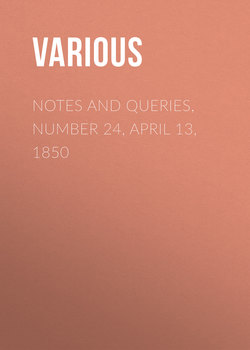Читать книгу Notes and Queries, Number 24, April 13, 1850 - Various - Страница 2
NOTES
CUNNINGHAM'S LIVES OF EMINENT ENGLISHMEN.—WHITGIFT AND CARTWRIGHT
ОглавлениеIn a modern publication, entitled Lives of Eminent Englishmen, edited by G.G. Cunningham, 8 vols. 8vo. Glasgow, 1840, we meet with a memoir of Archbishop Whitgift, which contains the following paragraph:—
"While Whitgift was footing to an archbishopric, poor Cartwright was consigned to poverty and exile; and at length died in obscurity and wretchedness. How pleasant would it have been to say that none of his sufferings were inflicted by his great antagonist, but that he was treated by him with a generous magnanimity! Instead of this, Whitgift followed him through life with inflexible animosity."—Cunningham's Lives, ii. 212.
Mr. Cunningham gives no authority for these statements; but I will furnish him with my authorities for the contradiction of them.
"After some years (writes Walton, in his Life of Hooker), the Doctor [Whitgift] being preferred to the see, first of Worcester and then of Canterbury, Mr. Cartwright, after his share of trouble and imprisonment (for setting up new presbyteries in divers places against the established order), having received from the Archbishop many personal favours, retired himself to a more private living, which was at Warwick, where he became master of an hospital, and lived quietly and grew rich;… the Archbishop surviving him but one year, each ending his days in perfect charity with the other."
To the same effect is the statement in Strype, which I borrow from Dr. Zouch's second edition of Walton's Lives, p. 217.:—
"Thomas Cartwright, the Archbishop's old antagonist, was alive in 1601, and grew rich at his hospital at Warwick, preaching at the chapel there, saith my author, very temperately, according to the promise made by him to the Archbishop; which mildness of his some ascribed to his old age and more experience. But the latter end of next year he deceased. And now, at the end of Cartwright's life, to take our leave of him with a fairer character, it is remarkable what a noble and learned man, Sir H. Yelverton, writes of some of his last words—'that he seriously lamented the unnecessary troubles he had caused in the Church, by the schism he had been the great fomenter of, and wished to begin his life again, that he might testify to the world the dislike he had of his former ways;' and in this opinion he died."
I find it stated, moreover, on the authority of Sir G. Paul's Life of Whitgift, that Cartwright acknowledged the generosity of Whitgift, and admitted "his bond of duty to the Archbishop to be so much the straiter, as it was without any desert of his own."—Carwithen's History of the Church of England, i. 527. 2nd edit.
Lest this should not suffice to convict Mr. Cunningham of error, I will adduce two extracts from The Life of Master Thomas Cartwright, written by the Presbyterian Sa. Clarke, in 1651, and appended to his Martyrologie.
"About the same time [viz. 1580], the Earl of Leicester preferred him [Cartwright] to be master of his hospital at Warwick, which place was worth to him about one hundred pounds."—Clarke, p. 370.
"For riches, he sought them not; yea, he rejected many opportunities whereby he might have enriched himself. His usual manner was, when he had good sums of gold sent him, to take only one piece, lest he should seem to slight his friend's kindness, and to send back the rest with a thankful acknowledgement of their love and his acceptance of it; professing that, for that condition wherein God had set him, he was as well furnished as they for their high and great places."—Ib. p. 372.
So much for the "poverty," the "wretchedness," of Cartwright, and the "inflexible animosity" of Whitgift. The very reverse of all this is the truth.
J.K.
